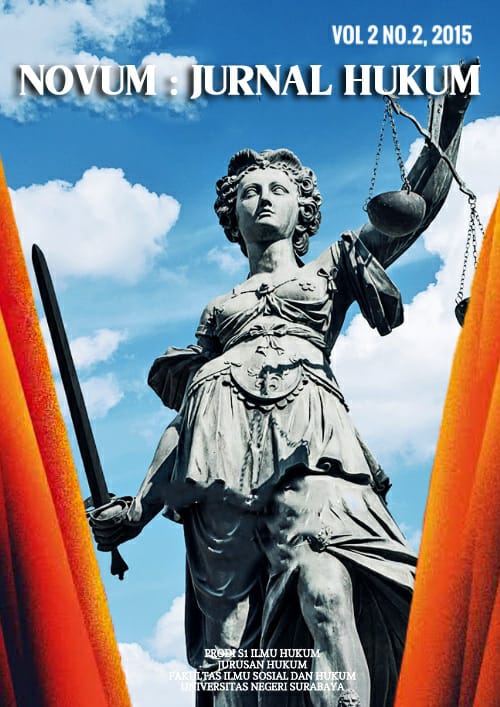TINJAUAN YURIDIS TERHADAP PUTUSAN MA NOMOR 45 PK/AG/2008/PENGADILAN AGAMAYOGYAKARTA MENGENAI UPAYA PK PADA PUTUSAN VERSTEK NOMOR318/Pdt.G/1991/PENGADILAN AGAMA YOGYAKARTA PERKARA PERCERAIAN
DOI:
https://doi.org/10.2674/novum.v2i2.14102Abstract
Prosedur permohonan perceraian pada dasarnya dibagi menjadi dua bagian, yaitu: pertama, bagi
mereka yang menganut Agama Islam, prosedur permohonan perceraiannya diajukan melalui Pengadilan Agama,
dan kedua, bagi mereka yang bukan beragama Islam prosedur perceraiannya diajukan melalui Pengadilan
Negeri. Pokok permasalahan yang didapat dalam kasus ini adalah adanya putusan PK. Dalam Putusan PK ini
dilatarbelakangi adanya putusan tidak hadir di depan Hakim (Verstek) dari Pengadilan Agama Yogyakarta pada
tahun 1990. Isi dari putusan tidak hadir di depan Hakim (Verstek) Pengadilan Agama ini dalam uraian mengenai
kejadian atau kronologis yang menjadi alasan gugatan (posita ) tidak sesuai dengan fakta lapangan dan menurut
Undang-Undang yang berlaku. Dikarenakan adanya kebohongan dan tipu muslihat yang dibuat oleh pemohon
(suami) dalam mengajukan permohonan cerai talak di Pengadilan Agama Yogyakarta. Penelitian ini
merupakanpenelitian yuridis normatif yang meliputi bahan hukum primer, sekunder dan tersier. Bahan hukum
sekunder ini ditunjang dengan normatif dokumentatif, yakni bahan penelitian hukum dicari dengan cara
penelitian kepustakaan termasuk wawancara dengan narasumber. Bahan hukum yang terkumpul kemudian
dianalisis secara kualitatif.Pada akhirnya disimpulkan bahwa sesuai dengan Putusan tidak hadir di depan Hakim
(Verstek) Nomor 318/Pdt.G/1991/PAYK telah memenuhi syarat formil dalam memutus perkara cerai talak dapat
dibenarkan dan hukumnya sah berdasarkan putusan peradilan perdata Pengadilan Agama, akan tetapi akan
berbeda apabila putusan tersebut merujuk berdasarkan Kompilasi Hukum Islam (KHI), karena menurut peneliti
hal tersebut merupakan putusan tidak sah, karena proses dan alasan-alasan sebelum turunnya putusan verstek
tidak terpenuhi, yaitu proses perceraian dan alasan-alasan perceraian, karena dalam kronologi yang telah
dijelaskan tidak memenuhi alasan-alasan perceraian tersebut.
Kata Kunci: Tidak Hadir di depan Hakim (Verstek), Peninjauan Kembali, Cerai Talak.
Abstract
Divorce application proceduresare basicallydivided intotwoparts: first, for those who are moslems,
divorcepetition proceduresare filed by aReligious Court, andsecond, for those who are notmoslems,divorce
proceduresare filed by the District Court.The subject matter obtained in this case is the decision of the Request
Civil. The background of this Request Civil is Verstek decision of the Religious Court of Yogyakarta in 1990.
Based on Posita, the contents of this verstek decision of religious court are not in accordance with the facts and
the existing law. This is due to the lies and deceptions which are made by the applicant (husband) in applying
for divorce at the Religious Court of Yogyakarta. This research is a normative petition juridical reviewwhich
coversprimary, secondary and tertiary legal materials. Secondary law is supported by the normative
documentary legal research materials through review of literature and interviews with informants. Legal
materials are then analyzed qualitatively. It is concluded that in accordance with Verstek Decision No. 318 /
Pdt.G / 1991/PAYK has filled the formal requirements in deciding the case of divorce. It can be justified and
legitimated based on civil judicial ruling of Religious Court, but it would have been different if the decision is
referred to the Compilation of Islamic Law. In this matter, the researcher assumes that the decision is invalid. It
is due to the fact that chronologically, the applicant (husband) could not provide the process and the reasons for
divorce before the Verstek decision was made.
Keyword:Verstek, Request Civil, Divorce Case.
Downloads
 Abstract views: 42
,
Abstract views: 42
, PDF Downloads: 129
PDF Downloads: 129



